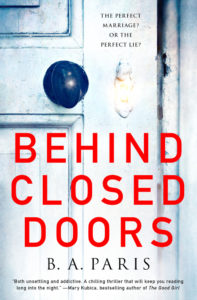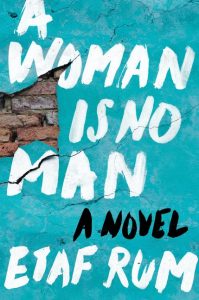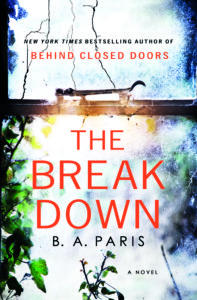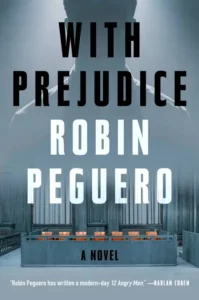 A man, a marriage too perfect – BEWARE! (Spring Eaton, twenty miles outside London, present-day): I hadn’t expected to be drawn into Behind Closed Doors, a UK bestseller destined for the movies. I don’t like the thriller genre largely because it’s driven by plot not prose. Two months ago, I discovered a psychologically suspenseful novel with exceptionally good prose, so I’ve been open to reading more. Often disappointed by publishing hype, this psychological thriller’s hype rings true. “Unputdownable” rings so true I must warn you if you read this novel at night you might have trouble sleeping. It’s that psychologically jarring. Also true is the praise that it’s “incredibly well-written,” which brings me to why I’m blogging about it, why I got so caught up in it.
A man, a marriage too perfect – BEWARE! (Spring Eaton, twenty miles outside London, present-day): I hadn’t expected to be drawn into Behind Closed Doors, a UK bestseller destined for the movies. I don’t like the thriller genre largely because it’s driven by plot not prose. Two months ago, I discovered a psychologically suspenseful novel with exceptionally good prose, so I’ve been open to reading more. Often disappointed by publishing hype, this psychological thriller’s hype rings true. “Unputdownable” rings so true I must warn you if you read this novel at night you might have trouble sleeping. It’s that psychologically jarring. Also true is the praise that it’s “incredibly well-written,” which brings me to why I’m blogging about it, why I got so caught up in it.
The narrator’s voice – Grace, married 18 months ago to a lawyer who never lost a case and resembles George Clooney – flows so effortlessly it feels as if she’s sitting by your side confiding her worst fears and opening up her good heart to you. Jack Angel – a surname he chose, a sadistic joke! – doesn’t have a heart, even though he’s “superficially charming” and can “strike observers as remarkably normal,” to quote one definition of a psychopath.
So, this isn’t a novel that just grips you at the opening; every page grips you. For you’re trying to figure out if someone could be this deranged and this clever to deceive not only your fiancé but everyone. You will be impressed by the intricate web of plausible deceit Jack – and British debut novelist B. A. Paris – have spun throughout. Which is why the novel scares us. Could this really happen in a marriage that seems so perfect to anyone looking in? Could a man so perfectly handsome, elegant, and gentlemanly be this emotionally sick to do what Jack does to Grace and has planned?
Leaving nothing to chance, he gives nothing away until the perfect woman comes along to execute his long-seated madness. He snaps her up in a matter of months. By the time he unveils enough of himself to her it’s too late, for he’s made sure there’s no escape.
The word perfect is effectively used, repeatedly. Perfect first appears on line 5 of the first chapter, titled “Present.” All chapters take place in the Present or Past, a clean design that has us glued to the deft and twisted machinations Jack frames, continually boxing Grace in.
Jack is the first to pronounce the word “perfect,” a response placed right on page 1 so we’re hooked, clued in something’s definitely not perfect in this household. Grace has accidently knocked into a bottle of champagne in the kitchen while dinner guests are in another room. She’s “hoping he [Jack] won’t have noticed how nervous I am.” Jack does, of course, because as we’ve already established, he doesn’t miss a trick. Why should a loving husband be pleased his newly married wife is anxious?
The dinner guests are two couples: Diane and Adam (he hailing from Jack’s law firm) and Esther and Rufus, new to the neighborhood and the group, emphasizing these are not Grace’s close friends. The dinner scene introduces the second, third, fourth, and fifth time the word perfect appears, with reference to Esther:
“I’m sure she’s been told over and over again that Grace Angel, wife of brilliant lawyer Jack Angel, is a perfect example of a woman who has it all – the perfect house, the perfect husband, the perfect lie.”
Hmm. By page 2 it’s confirmed: something’s horribly amiss!
The strongest word for the extreme opposite of perfect – nightmare, psychological torture, hell – depicts Grace’s predicament and husband. Worse, Jack is so frighteningly “brilliant” and cruel the only person who knows the marriage is a horrific lie is Grace. She finds that out on her wedding night in Thailand, revealed around page 85. That’s when it hits us Jack is clearly not who he purports himself to be. Grace is not only far from home, she’s far, far away from being “the luckiest person in the world.” Tragically, Jack’s old-fashioned manners and handsomeness wooed her. “He made me feel special, cherished, and best of all, he adored Millie.”
Millie is Grace’s younger sister, born with Down’s syndrome. Her parents didn’t want any children, let alone Millie. So when Grace meets Jack in a park when she’s with Millie and he dances with Millie, Grace falls under his wicked spell. Jack is awfully accepting of Millie, too willing to offer that when Millie turns 18 she can come live with the newlyweds. Jack knows Grace has promised she’ll take care of Millie after she’s finished her mainstream schooling (with a constant caregiver, Janice), which Grace fought hard for so Millie is never institutionalized. Up until now, it’s the reason Grace hasn’t had a serious suitor. Millie will be graduating soon. The clock is ticking.
You can’t help but admire Grace’s deep love and devotion for Millie. She grew up taking care of her. Their bond is beautiful: “I love Millie more than life itself and wouldn’t change her for the world.” It’s one of the few aspects of Grace’s story that’s beautiful.
Another could be their home which appears to be gorgeous until you get behind closed doors. Jack gave the home to Grace as a wedding present. They’d talked about her dream home, but it didn’t include being outfitted with two sets of metal gates, hidden by “high walls around it so nobody can see in.” Set in a fictional village that sounds a lot like a real village that appeals to Grace is a perfect façade. Apparently, Surrey is located in England’s wealthiest county, so Hollywood-type seclusion wouldn’t raise any red flags.
Then again, Jack has made sure there’s no one on the lookout to be suspicious. For starters, Grace’s parents will soon be moving to New Zealand. Perfect. Jack insisted Grace quit her job with the lavish Harrod’s department store. Travel requirements, he reasoned, wouldn’t be good for a fledgling marriage. She’s a fruit buyer, travels to South America. Who gives up an interesting job like that so easily? Grace, because of Millie. Perfect. Jack’s even offered to pay for Millie’s expenses until Millie comes to live with them, so why should Grace work?
Meanwhile, early on Grace allows Jack to take away her cell phone. Quickly, she loses touch with two good friends. She’s so gullible and unsuspecting because Jack is so “meticulous” in setting up that perfect lie. Losing friends, family, job, and communications would unnerve us. Not Grace, at first. She’s so focused on Millie’s welfare she loses track of her own. Maybe that seems implausible but if you’ve spent your entire life putting someone else’s needs above your own the pattern is fixed. As we put ourselves in Grace’s shoes, we see how she got herself into this nightmare, how she is Jack’s perfect wife.
One thing you’ll love about the developmentally challenged Millie character is that she’s quite perceptive. By page 23, you sense it’s Millie who will give Grace her extraordinary “resolve.”
Can Grace extract herself from this nightmare? Before Millie becomes a victim too? How? This is what keeps us turning pages, perhaps late into the night.
Lorraine




